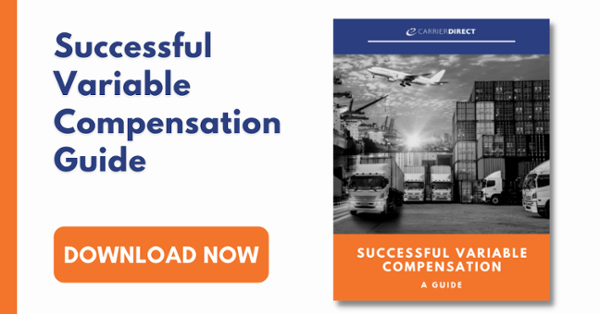Employee morale, employee retention, team performance, and company culture are just a few of the areas that are impacted by your compensation strategy. A weak compensation strategy will reveal itself via symptoms like low morale, high employee turnover, low performance, and below par company culture. A strong compensation strategy attracts the right talent, retains the right talent, and contributes to a healthy company culture. Compensation is one way to ensure your employees feel properly valued, appreciated, and motivated.
Are you confident that your company’s compensation strategy is functioning properly? Or are you concerned it may be faulty and thus contributing to other pain points in your business?
We understand the importance of addressing all obstacles standing in the way of your business progress and growth. From our extensive experience assessing and improving compensation structures for transportation and logistics businesses, we know some key signals that your compensation strategy needs some fixing up. Our aim is to help businesses like yours identity issues quickly, so they can be resolved as fast as possible as well.

This is why we put together this list of signs that your company's compensation strategy needs repair.
1. You are Worried that You are Overpaying Some Employees
First, let’s level-set that no specific compensation number is necessarily too high to be paying employees. Instead, think about “overpaying” strictly as providing higher compensation than the value your company is receiving from someone. If an employee is providing enough value to your company, higher compensation is not just reasonable but necessary for retention. However, if you feel that the value is not there, it may be a symptom of your compensation strategy. The likely culprit is your incentive structure - is it properly aligned with your company’s goals? (Need more guidance on incentive structure? Download our Guide to Successful Variable Compensation.)
Don’t think about how you can find cost savings by paying your employees less, think about how you can encourage your employees to provide more value for a fair price. A mature, developed compensation strategy with data-driven variable compensation ensures that you won't “overpay” an employee. With an intentional compensation strategy, you will have guardrails in place to proportion compensation to value.

2. High Employee Turnover is Costing You
Turnover rate is rarely tied to just one specific factor. This metric could be reflective of various issues (e.g., engagement in the area of work, culture fit, alignment with company goals), but compensation is definitely a factor to investigate. It is important to note that not all turnover is bad. Employees who leave because they no longer enjoy the work they are doing or because they don’t align with your company’s goals and values should experience a mutual, welcome departure.
However, employees who leave because they don’t feel fairly compensated will cost your company significantly in recruiting, hiring, onboarding, and training costs. This is an avoidable scenario! Employees who leave for higher pay know their skills are strong and marketable. A strong compensation strategy will show employees that when they provide enough value to the company, their pay will reflect that proportionally. A strong compensation strategy will enable any employee to achieve their desired, fair pay right where they are.
3. Your Employees Don’t Understand Their Pay Structure

One issue we see time and again in transportation and logistics is that employees don’t fully understand how their pay structure works. This is a problem because employees are unable to see how their day-to-day work directly impacts the money they take home, which is one of the primary motivating factors for employees in the workplace. Every day, every single employee shows up to work (or logs on these days) with a simple, yet extremely consequential, question: How hard should I try today? Employees who don’t understand their pay lack that monetary incentive that drives hard work.
The most encouraged and motivated employees understand how their day-to-day work contributes directly to their pay. For example: “This next customer sale will increase my monthly paycheck directly by $x” or “fixing this client issue will grant me access to $y more in potential variable compensation.”
Keep in mind: Compensation strategy is not just about having the right structures and numbers in place. The best plan can fall apart if not rolled out correctly. Even a high quality compensation plan will fall flat on its face if it is not communicated, explained, and fully understood by your employees. The transparency and understanding of pay is what completes compensation as a “strategy”.
4. You're Not Attracting the Right Talent to Drive Business Growth
First of all, “top talent” is not what your business needs. As Ryan Schreiber explains as a guest on Joe Lynch’s Logistics of Logistics podcast episode The Right Talent – Recruiting Training and Retaining, “today, top talent means ‘what looks good on a resume’...the right talent needs to be your focus because it is about looking inside of your organization to solve the problems and build the organization you have.”
Now, with a focus on “right talent,” your compensation offering needs to be attractive. When candidates are looking for jobs, they have a limited view into what it is truly like to work at your company. Certain companies have perceived company cultures, but candidates won’t know your company’s true work environment until they have spent time in the business. Therefore, when deciding their next career move, candidates see what they can tangibly assess; job descriptions and compensation. When the right talent looks at your company, they need to be able to see that compensation will be sufficient, fair, and motivating for the effort they are going to put into their day-to-day work. They need to be able to see a well structured compensation strategy.
5. Your Business has Changed in the Past 5 Years
If your business is exactly the same as it was 5 years ago, you’re fine.
If your business has shifted focus, grown in size, brought on new technology, or changed in any other way, your compensation strategy should have shifted accordingly. If it hasn't, it's time to repair this. Shifting business focus requires new goals that employees are striving towards. Compensation needs to reflect that. Growing businesses have to account for more narrow job roles and scalability. Compensation needs to reflect that. Technology has enabled people to be able to get more done in less time. Compensation needs to reflect that. Have we made our point?
Compensation has the power to be a driver of your business growth. A strong compensation strategy does this by aligning your compensation to your company goals, ensuring employees are paid fairly for the value they provide, ensuring employees are focused on the high value activities that grow the business, and accounting for shifts in a changing business.
If any of the signs here are blinking for your company, it is time to repair your compensation strategy.





